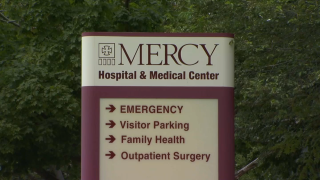
Chicago’s oldest hospital announced Wednesday it will close next year after the state of Illinois failed to finance its merger with three other money-losing hospitals.
Mercy Hospital & Medical Center on the city’s South Side has been struggling for years due to decreasing reimbursements, a decline in the largely African American population in the surrounding neighborhood, and increased capital needs. Administrators say Mercy's monthly operating losses of $4 million can no longer be sustained.
An outpatient facility is in the works that will be able to care for up to 50,000 patients. Although details about timing and location are still being determined, administrators say it will offer everything from diagnostics to urgent care.
Mercy Hospital president Carol Schneider said the decision to close was not easy.
"Patients on the South Side have unmet needs within the current system,” Schneider said in a statement. “The transformation from an inpatient model to one with greater access to outpatient services will better address the disparate outcomes in health from which our community suffers today.”
Deborah Harris, executive director of the nonprofit Action Now, said the closure of Mercy Hospital is another blow to African Americans who will have to leave the neighborhood for health care.
“To close a health care facility in the middle of a pandemic is outright telling me you do not care about Black folks, brown folks, disenfranchised folks finding access to health care,” Harris said.
Local
A $1.1 billion plan announced in March called for the merger of Mercy, South Shore Hospital, Advocate Trinity Hospital and St. Bernard Hospital. The plan, later scrapped, included the construction of one a hospital and a network of community health centers. One or more of the hospitals would have been closed under the plan.
The hospitals asked the Legislature for $110 million for fiscal year 2021 and a total of $520 million over five years to offset losses as they created the system and built a hospital. The remainder of the money was to come from the hospitals, their parent organizations and donations. Lawmakers did not include the money, which would have come from Medicaid funds, in legislation passed after the request.
Mercy dates to 1852, when a rooming house was converted into a hospital by the Sisters of Mercy. It survived the Chicago Fire of 1871.



